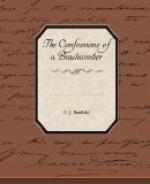CASUAL AND UNPRECISE
These observations of mine are admittedly casual and unprecise. Not the life of a single bird or insect has been sacrificed to prove “facts” for personal edification or entertainment. Cases in which points were inconclusive have been allowed to remain undecided. The face of the administrator of the law here is rigidly set against the enforcement of the death penalty, simply because the subject is beautiful, or rare, or “not understood.” With the aid of a good telescope and a compact pair of field-glasses, birds may be studied and known far more pleasurably than as stark cabinet specimens, and, perhaps, with all the certainty that the ordinary observer needs. Patience and a magnifying glass put less constraint on insects than lethal bottles and pins.
An observer who was prepared to satisfy doubts with the gun might, possibly with ease, bring up the Bird Census of the island to one hundred and fifty. Such a one may find pleasure in the future in demonstrating how much more than a seventh of the birds of Australia dwell upon or visit the spot. The present era of strict non-interference has resulted in an increase, however small, in the species represented. Whereas in years gone by but two species of sea-birds nested on Purtaboi, now at least six avail themselves of that refuge.
Birds that were driven to remote reefs and banks of the Barrier now make themselves at home for three months of the year within hailing distance. Tidings of goodwill towards the race generally are beginning to spread. Gladness compels me to record a recent development of the protective laws. Space for the rearing of families at the headquarters of the terns—Purtaboi—having been gradually absorbed during recent years, the overflow—comprising perhaps a thousand amorous birds—has taken possession of the sand spit of Dunk Island. So calm are they in the presence of man, so sure of goodwill, that when temporarily disturbed, they merely wheel about close overhead, remonstrating against intrusion in thin tinny screams, and settle again on their eggs before the friendly visit is well over. Not for ten years at the least have sea-birds utilised this spot. Realising their privileges elsewhere in the immediate neighbourhood, they have thrust themselves under official protection. They crowd me off a favourite promenade, mine by right of ten years’ usage. They scold every boat, affront passing steamers, and comport themselves generally as if on the assurance of counsel’s opinion on the legality of their trespass.
And so it has come to pass, that the example of the uninfluential Beachcomber, in the establishment of an informal and unofficial refuge for birds, has been warranted and confirmed by the laws of the country. A proclamation in those terms, those good set terms, which time and custom approve, forbids shooting on this and two neighbouring groups of islands. Is there not excuse in this flattery for just a little vainglory?




